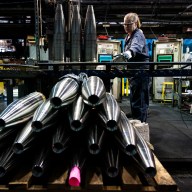In Sophia Takal’s indie psychological thriller “Always Shine,” Mackenzie Davis plays Anna, a struggling actress who goes off for a little getaway to Big Sur with a friend, Beth (Caitlin Fitzgerald). Beth is successful; Anna is not. It doesn’t take long for anxieties bubbling under the surface to rise, at which point a drama turns into a different kind of film entirely. It’s an even more intense and shouty type of role than the “Halt and Catch Fire” actress usually gets. (She did play shy in the “San Junipero” episode of “Black Mirror.”) And the film taps into Davis’ own concerns about how society demands women conform to a limited number of types. Davis, 29, talks to us about what “Always Shine” says about what we expect from women, being apologetic and her difficulty when playing quiet.
This film says a lot about the way roles for women are so limited that even when one actress isn’t successful and another is, the one that is has to put up with less-than-desirable roles. RELATED: Interview: Marion Cotillard on “Allied” and keeping hope after the election Society demands that women conform to certain types. Otherwise they’re ignored, and if they speak out, they’re attacked. I think we’re all encouraged to be performative in some way, even if you’re a man. I swear I wasn’t trying to make this about how hard it is to be a man. [Laughs] Sorry to bring it back to men once more. That’s my bad. Speaking of talking, and without getting into spoilers, you wind up playing a second character later in the film, one who rarely speaks. Not being able to verbalize, even as a character, I’m sure was difficult. Did you find the character’s difficulty with speaking hard in your episode of “Black Mirror,” where you play someone who’s very shy? You get that with Anna.
The actress thing, to me, is secondary to the female aspect. What was important to me was the consequence of asking women to perform very specific types of gender identity in order to be successful — personally, professionally and in any way. The actress thing is a super smart surrogate for this gender expression, because [being an actress] requires an emblematic version of that ideal. There’s a powder keg that arises when you ask women to put themselves into smaller and smaller boxes. At a certain point, those boxes can’t contain all the self-loathing that you’re putting in them. And they will just explode.
You exist in this liminal space where you’re constantly trying to figure out how to adjust your body or your behavior to be more like the version of success you see. That’s a really [laughs] claustrophobic experience to have — to constantly have to become a thing that is not tangible or real. It’s just a vision you see in front of you that’s better than you are.
Of course! We’re all asked to perform. I think the repercussions for women are wider known. I can’t speak to the male experience; I can only speak to the female experience. I find it hard. I especially found it hard growing up and not being very petite or shy. I was aggressive and a maybe little bit violent and intense. There is something unfused about my self-expression. I, uh [laughs], I got a lot of feedback, that it was wrong and gross and undesirable. I saw what was considered desirable next to me all the time, and I tried to become those things. I think it’s super impressive for men, too.
No! But I do think we’re all expected to exist in a really binary, perfect version of self. That’s what we’ve been sold. It’s not more impressive for me than it is for you, except that women are used to sell things more than men. Those images exist in a vaster quantity. Society is built on your side, ultimately. There are oppressive things for both genders, but society, it’s rigged for you. [Chuckles]
We’re both very apologetic people and need to be understood exactly as we mean ourselves to be. I always had that frustration when I was younger. I hated anybody talking about me or anything that didn’t come directly from my mouth. I only wanted to be understood as I articulated myself. It’s a control thing.
Yeah, it was really unpleasant. It’s like when Ariel loses her voice so she can have legs and be with a man. It was so horrible and claustrophobic. She wants to engage but can’t find a way in. It’s like when you find a natural in to the conversation, so you never speak at all but still want to contribute. Or finding that place in Double Dutch when you can jump in. She can never find it. I found it very suffocating.
No, because Beth doesn’t evolve and Yorkie does. Beth is an echo chamber for other people’s most glowing ideas of themselves. She attracts a lot of men who want a vessel to contain their egos. That’s a slightly s—ty place to occupy. Yorkie evolves so much over the course of an hour. There is something active to her; at least she’s trying to find her voice. Beth was just voiceless. I like a little catharsis with my jobs.
Yeah, too much. It was intense. It was ugly. It was a seething nastiness. It didn’t feel clean. It felt very messy. But Sophia created such a cool environment up there, where we felt really safe to do anything. It was jarring when we finally saw the movie at in front of an audience. Both Caitlyn and I were shaking afterwards. It was like, “We did a lot of secret stuff up there that is now very public.” That’s what makes interesting art, I think — I hope. But it feels extremely exposing and vulnerable to have that out there.
Mackenzie Davis on what ‘Always Shine’ says about society and women
Follow Matt Prigge on Twitter @mattprigge


















